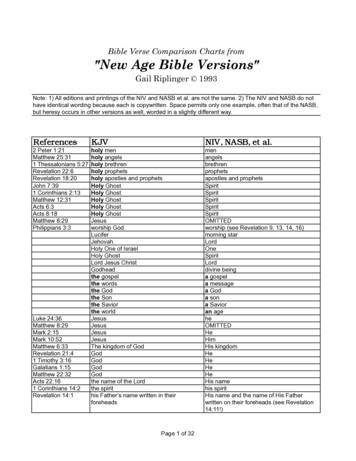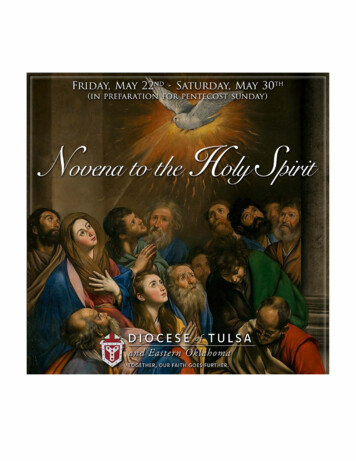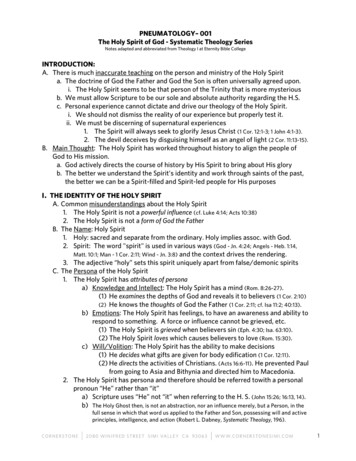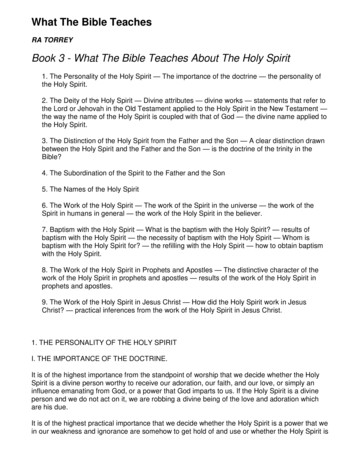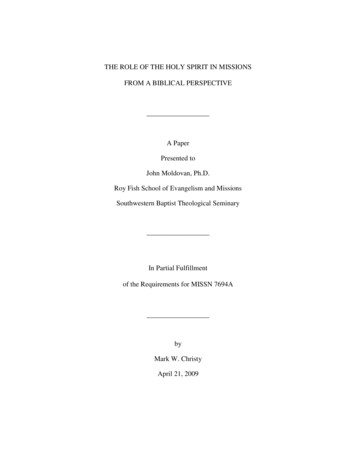
Transcription
Teaching NotesOn the Holy SpiritOn The Holy SpiritByMark McGee1
Teaching NotesOn the Holy Spirit2ChapterThe Holy Spirit: Introduction3The Holy Spirit: Going Deeper6Seven Responses to the Spirit of God 16
Teaching NotesOn the Holy Spirit3The Holy Spirit: IntroductionTeaching God’s Word is one of the highest privileges and responsibilities onearth. I’ve been looking through some Teaching Notes from the 1970’s tosee what I studied and taught in the early years of ministry. So far, we’velooked at Teaching Notes On Teaching, On God, On The Sovereignty ofGod, On The Holiness Of God, On The Trinity, On Jesus Christ, On WhyJesus Came, On Jesus’ Death And Resurrection, and On The JudgmentSeat Of Christ. If you haven’t looked at these notes yet, we invite you toread them and to use them in any way that helps in your teaching ministry.We turn now to Teaching Notes On The Holy Spirit.[These notes are from 40 years ago when I spoke to a group of pastors.The notes are in outline form.] The Holy Spirit was actively involved in the creation of all things(Genesis 1:2) He is called God in Acts 5:3-4 He is Eternal (Hebrews 9:14) He is All-Powerful (Luke 1:35) He is All-Knowing (1 Corinthians 2:10-11) He is Everywhere-Present (Psalm 139:7-13) He is Sovereign (1 Corinthians 12:6, 11)
Teaching NotesOn the Holy Spirit4The Holy Spirit gives clear evidence of being a Person – He speaks (Acts 28:25) He teaches (John 14:26) He strives with sinners (Genesis 6:3) He comforts (Acts 9:31) He helps our infirmities (Romans 8:26) He can be vexed (Isaiah 63:10) He can be grieved (Ephesians 4:30) He can be resisted (Acts 7:51)The Holy Spirit’s work on earth (in the world) is to convict men (John16:8-11)His ministry among believers is to – regenerate them (John 3:3, 5) indwell them (Romans 8:11) anoint them (1 John 2:20, 27) place them into the body of Christ (1 Corinthians 12:13) guide them (John 16:13) set them apart for usefulness (Romans 15:16) comfort them (John 14:16-26) give them joy (Romans 14:17) give them gifts (1 Corinthians 12:3-11) bear fruit through them (Galatians 5:22-23)
Teaching NotesOn the Holy Spirit5The Holy Spirit is our Teacher, Guide, Helper, Comforter and Friendthroughout the days, months and years. He’s always there and speaksquietly but strongly about our walk with God. He is extremely patient andkind and has my deepest love and respect.
Teaching NotesOn the Holy Spirit6The Holy Spirit: Going DeeperI.The Spirit of God: In PersonA. The Spirit is a Person1He does those things which are possible only for a person to do(John 14:26)2He is affected as a person by other beings (Ephesians 4:30)3All Bible terms related to the Spirit imply His personalityB. The Spirit is God1He is called God (Acts 5:3-4)2He has the attributes of God (Hebrews 9:14)3He performs the works of God (1 Corinthians 6:11)4He is presented in Scripture as a personal object of faith (Matthew28:19)II. The Spirit of God: In the Beginning“In the beginning God created the heaven and the earth. And the earth waswithout form, and void; and darkness was upon the face of the deep. Andthe Spirit of God moved upon the face of the waters.” Genesis 1:1-2“Spirit” – ruwach . wind or breath pneuma . wind or breath“hovering over – rachaph to brood over, to hover over with a gentlewavering or fluttering motions, as of a bird over her young
Teaching NotesOn the Holy Spirit7III. The Spirit of God: In HistoryAs one studies the Old Testament, the Spirit of God is mentioned dozens oftimes as being very much involved in the life of the nation Israel and thehistory of other ancient civilizations . (also involved in Jesus’ birth andministry)IV. The Spirit of God: In the WorldA. John 14:16-171. Counselor (NIV) Comforter (KJV) Helper (NASB)parakletos – “called to one’s side”It was used in a court of justice to denote a legal assistant, counsel for thedefense, an advocate, one who pleads another’s cause. The wordsuggests the capability and adaptability of the person to give aid. It has ameaning of strength.2. Spirit of truthaletheiaA few verses earlier (14:6), Jesus said that He was the aletheia.3. to be with you foreveraion – “age”
Teaching NotesOn the Holy Spirit84. The world cannot accept this Counselorlambano (active verb) – “to take, to get hold of”5. because it neither sees him nor knows himtheoreo – “to be discerning and perceptive spectator”ginosko – “to recognize, to understand”The things of the Spirit are spiritually discerned. “Jesus said, except a manbe born again, he cannot see the kingdom of God.”eido – “to be aware of, to perceive, to understand”6. But you know himeido – “to be aware of, to perceive, to understand”7. for he lives with you and will be in youmeno – “to stay, remain”sun – a primary preposition denoting unionen – a primary preposition denoting fixed positionB. John 15:26-27The Spirit will testify about Christmartureo – “to bear witness, record”C. John 16:5-111. When he comes, he will prove the world wrongelegcho – “tell a fault, rebuke, admonish, convict, convince”
Teaching NotesOn the Holy Spirit9The word can be used in the sense of showing or exposing someone hiswrong or sin with a view to repentance. It can also be used in the sense ofconvicting with a view of condemnation and judgment; to bring in guiltywithout any confession or feeling of guilt by the guilty one.2. about sin and righteousness and judgmenthamartia – “a missing of the mark, an offense”dikaiosune – “the character or quality of being right or just”krisis – “a separating, condemnation, accusationa. about sin, because men do not believe in mepisteuo – “to have faith, to trust”b. about righteousness, because I am going to the Fatherhupago – “to depart, lead oneself”c. about judgment, because the prince of this world now standscondemnedkrino – “tried and punished”V. The Spirit of God: In the ApostlesA. John 14:261. “will teach you all things”didasko – “to instruct”panta – “everything”
Teaching NotesOn the Holy Spirit102. “will remind you of everything”hupomimnesko – “to remind quietly, to suggest to the memory”panta – “all things”B. John 16:12-161. He will guide them into all truthhodegeo – “to show the way”pas – “the whole, every”aletheia – “truth, true”2. He will not speak on His own, He will only speak what He hearslaleo – “say, tell, utter, talk”akouo – “to come to the ears(Parallel with John 15:15)3. He will tell you what is yet to comeanaggello – “to report, declare”Literal – “for not will he speak from himself, but what things hehears, he will speak, and the coming things he will announce to you.”What did the Spirit of God announce in detail to the apostles? (1Corinthians 2:1-16)(Note: “revealed” is apokalupto – “to take off the cover”)
Teaching NotesOn the Holy Spirit4. He will bring glory to Christ“He” is literally “That One”doxazo – “to magnify, to render glorious”5. by taking from what is mine and making it known to youlambano – “to take, to get hold of”anaggello – “to announce in detail”6. All that belongs to the Father is mineecho – to hold7. The Spirit will take from what is mine and make it known to youlambano – “to take, to get hold of”anaggello – “to announce in detail”VI. The Spirit of God: In UsA. He is in us (1 Corinthians 3:16)1. “you yourselves are God’s temple”naos – a shrine (dwelling place of divinity)2. “God’s Spirit lives in you”oikeo – to occupy a houseen – a primary preposition denoting a fixed position11
Teaching NotesOn the Holy Spirit12B. He is our seal and deposit (Ephesians 1:13-14)1. “you were marked with a seal”spragizo – to stamp (with a signet or private mark for security orpreservation)In the first century this Greek word was used for placing specialmarks on shipments and letters. The sealing was the last thing done priorto delivering to prove who it belonged to and to ensure the arrival of itscontents in tact. It demonstrated safety.In the symbolism of Scripture a seal signified basically three things: a finished transaction ownership security2. “who is a deposit guaranteeing our inheritance”arrahabon – a pledge (part of the purchase-money or property givenin advance as security for the rest). Modern Greek uses the word for anengagement ring.kleronomia – hairship, a possession, an inherited propertyC. He made us sons and heirs of God (Romans 8:14-17)1. “you received the Spirit who makes you sons”huiothesia – placing as sons, adoption
Teaching NotesOn the Holy Spirit13In Greek grammar the construction is subjective genitive in which thenoun of action (adoption) becomes the verb of the subject (Spirit). The HolySpirit performs the acts of adopting. It is a term of relation, expressing oursonship in respect of standing. It is the acceptance into a family of thosewho do not by nature belong to it, and the placing of those who are notsons originally and by right in the relation proper to those who are sons bybirth.2. “heirs of God and co-heirs with Christ”kleronomos – denotes one who obtains a lot or portion, especially ofan inheritancesugkleronomos – co-inheritor, participant in common, heir together,heir with, joint-heirD. He sanctifies us positionally (1 Peter 1:2)“by the sanctifying work of the Spirit”hagiasmos – to set apart for purificationThe construction is subjective genitive again and sanctificationbecomes the verb of the subject Spirit. The Spirit does the sanctifying. Theelect are – chosen according to foreknowledge set apart for purification for obedience to Christ and sprinkling of His blood
Teaching NotesOn the Holy Spirit14E. He baptized us into the body of Christ (1 Corinthians 12:13)“for we were all baptized by one Spirit into one body”baptizo – to place into“by” is a primary preposition which is locative of sphereThe word “Spirit” is in the instrumental case in the Greek. The verb“baptized” is in the passive or middle voice. The personal agent who doesthe placing into is the Holy Spirit. We could translate: “by means of thepersonal agency of one Spirit, we all were placed into one body.”“into” is a primary preposition indicating the point reached or enteredThat point is the “body” or soma which means the body as a whole.Up to this point we have mentioned those things that the Spirit has done forevery Christian. Now let’s look at what He desires to do for every believer.F. He desires to sanctify us progressively (1 Thessalonians 5:23)“sanctify you through and through”hagiazo – to make holyholoteles – complete to the endG. He desires to fill us (Ephesians 5:18)“be filled with the Spirit”pleroo – to make replete, filled up full(with should be translated by)
Teaching NotesOn the Holy Spirit15Thayer’s Lexicon states – “What wholly takes possession of the mind,is said to fill it.”It implied control.H. He desires to produce His fruit within us (Galatians 5:22)“the fruit of the Spirit”karpos – fruitIn view of all that the Spirit of God does for us, what can we do for Him?
Teaching NotesOn the Holy Spirit16Seven Responses to the Spirit of God1Love Him2Worship Him3Submit to Him4Cooperate with Him5Obey Him6Don’t grieve Him (Ephesians 4:30) lupeo – to distress, to cause painor sorrow7Don’t quench Him (1 Thessalonians 5:19) sbennumi – to extinguish afire[These Teaching Notes were presented to a group of pastors during specialmeetings in the 1970s. We invite you to download, print and use as Godleads.]Copyright 1990-2017 GraceLife Ministries
On the Holy Spirit 13 In Greek grammar the construction is subjective genitive in which the noun of action (adoption) becomes the verb of the subject (Spirit). The Holy Spirit performs the acts of adopting. It is a term of relation, expressing our sonship in respect
